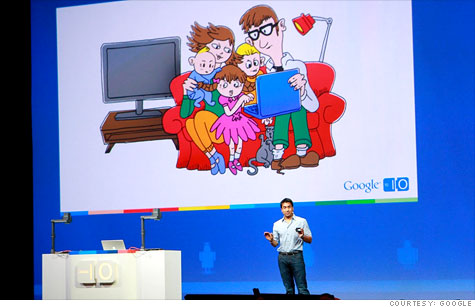@CNNMoneyTech May 11, 2011: 7:55 AM ET

At its annual I/O developers conference in San Francisco on Tuesday, the company previewed Android@Home, a future platform that will allow you to interact with practically any electronic device you own using Google (GOOG, Fortune 500). Connected devices like home media equipment, dishwashers, cars, and lights could soon be able to be controlled using the new platform.
"We'd like to think of your entire home as an accessory, or better yet as a network of accessories, and think of Android as the operating system for your home," said Joe Britt, head of the Android@Home team.
Controlling connected devices with a smartphone, tablet, PC or another gizmo has been discussed for years. Recently, some early attempts have emerged, including pill bottles that link to your phone or cars that can be turned on with through a mobile app. But those are prototypes -- little has been done on a larger scale.
The chief obstacle to making that happen across all connected devices is finding a single, open standard to control everything you own. Right now, most manufacturers of connected devices write their own proprietary software for controlling appliances. Your iPhone can control your Apple TV, and Windows Phone can control your Windows PC, for instance.
But down the road, what happens if your LG washer and dryer want to talk to your Apple router, controlled by your HP smartphone? If each used its own proprietary standards, that would likely be impossible.
Google thinks that it has a solution to that problem.
Android@Home was developed as an open protocol that can be used by any connected device and controlled by any wireless device or computer -- including non-Android devices like Apple's (AAPL, Fortune 500) iPhone or Microsoft's (MSFT, Fortune 500) Windows PCs.
Google's partners say that while they expect Android devices to be the first to use the new platform, other mobile device makers will follow suit. No date has been announced yet for when Android@Home will be available.
LED light manufacturer Lighting Science lined up as an early Android@Home partner and was featured prominently in Google I/O's keynote address on Tuesday. Lighting Science is creating light fixtures with wireless transponders, which will communicate with a wireless hub. That hub will be able to connect to devices using Google's new platform.
The advantage of Android@Home is that any developer can write an application to control the lights, said Eric Holland, Lighting Science's vice president of electrical engineering. They don't need to learn any proprietary protocol from Lighting Science -- and one app could control fixtures from all participating lighting companies.
Google took its own crack at an Android@Home device, demonstrating a prototype home media system called "Project Tungsten." The device itself runs the Android OS, and it can be wirelessly directed to play music anywhere in the home with a mobile device.
Project Tungsten works with Google's new Music Beta service, but Google didn't say if or when the device would be released into the wild.
Wireless isn't the only way Google is expanding Android beyond mobile gadgets. Android can now connect via USB -- and, soon, via Bluetooth -- to other devices in your home as well.
Exercise equipment maker Life Fitness, for instance, developed a tool that allows Android devices to connect with treadmills, exercise bikes or other equipment and download workout data to users' phones.
Google decided to have a little fun with Android's new technology as well. Robots powered by Android smartphones and tablets were wandering around the conference, and Google installed a giant labyrinth controlled by an Android tablet. The company also partnered with Hasbro to make a prototype robotic toy that walks your smartphone up to you and begs you to interact with it.
Soon, you may be using your phone to interact with all the devices in your home -- whether they beg you to or not.




No comments:
Post a Comment